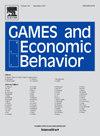传递:理论与实验
IF 1
3区 经济学
Q3 ECONOMICS
引用次数: 0
摘要
我们从理论上和实验上研究了“传递回报”行为背后的心理动机。继Rabin(1993)、Fehr和Schmidt(1999)、Dufwenberg和Kirchsteiger(2004)之后,我们构建了一个包含利他主义、不公平厌恶和间接互惠的心理博弈论模型。我们使用一些游戏来测试这个模型,在这些游戏中,玩家可能会在从一个不相关的捐助者那里收到礼物后选择给陌生人。我们的实验表明,利他主义和间接互惠会刺激人们做出善意的行为,告诉我们善意是如何产生更多的善意的。然而,不公平厌恶阻碍了给予,即使给予会让一个人的善意得到回报。我们的论文揭示了友善的行为是如何在从未直接互动的各方之间传递的,这对工作场所、社区和社区中社会规范和行为行为的形成有影响。本文章由计算机程序翻译,如有差异,请以英文原文为准。
Pay it forward: Theory and experiment
We theoretically and experimentally investigate psychological motivations behind pay-it-forward behavior. We construct a psychological game-theoretic model that incorporates altruism, inequity aversion, and indirect reciprocity following Rabin (1993), Fehr and Schmidt (1999), and Dufwenberg and Kirchsteiger (2004). We test this model using games in which players choose to give to strangers, potentially after receiving a gift from an unrelated benefactor. Our experiment reveals that altruism and indirect reciprocity spur people to pay kind actions forward, informing how kindness begets further kindness. However, inequity aversion hinders giving even when giving will allow one's kindness to be paid forward. Our paper informs how kind behaviors get passed on among parties that never directly interact, which has implications for the formation of social norms and behavioral conduct within workplaces, neighborhoods, and communities.
求助全文
通过发布文献求助,成功后即可免费获取论文全文。
去求助
来源期刊

Games and Economic Behavior
ECONOMICS-
CiteScore
1.90
自引率
9.10%
发文量
148
期刊介绍:
Games and Economic Behavior facilitates cross-fertilization between theories and applications of game theoretic reasoning. It consistently attracts the best quality and most creative papers in interdisciplinary studies within the social, biological, and mathematical sciences. Most readers recognize it as the leading journal in game theory. Research Areas Include: • Game theory • Economics • Political science • Biology • Computer science • Mathematics • Psychology
 求助内容:
求助内容: 应助结果提醒方式:
应助结果提醒方式:


